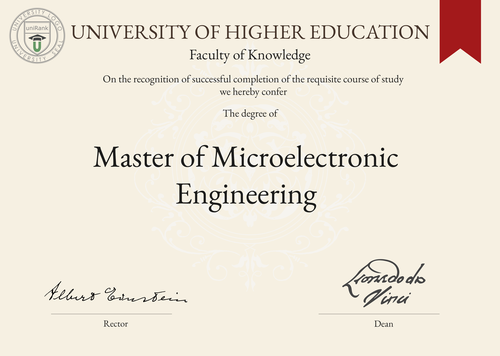
Master of Microelectronic Engineering (MME)
Guide to Master of Microelectronic Engineering Program/Course/Degree
Master of Microelectronic Engineering (MME)

Program Name:
Master of Microelectronic EngineeringProgram or Degree abbreviation:
MMEDuration range:
The duration of the Master of Microelectronic Engineering program can vary depending on the country or university. Typically, it ranges from 1 to 2 years.Tuition range:
The tuition fees for the Master of Microelectronic Engineering program can vary depending on the country or university. Generally, the range is between $10,000 and $30,000 per year.Overview:
The Master of Microelectronic Engineering program is designed to provide students with advanced knowledge and skills in the field of microelectronics. It focuses on the design, fabrication and testing of microelectronic devices and systems. Students will gain a deep understanding of semiconductor materials, integrated circuit design, nanotechnology and other related areas.Curriculum Overview by year:
The curriculum of the Master of Microelectronic Engineering program is structured to cover both theoretical and practical aspects of microelectronics. The coursework is typically divided into the following years: Year 1: - Semiconductor Physics - Analog and Digital Integrated Circuit Design - Microfabrication Techniques - Electromagnetic Fields and Waves - Microelectronic Devices Year 2: - VLSI Design - Advanced Topics in Microelectronics - Nanotechnology - Microelectronic Testing and Reliability - Research ProjectKey Components:
The key components of the Master of Microelectronic Engineering program include: - Semiconductor physics and materials - Integrated circuit design - Microfabrication techniques - Nanotechnology - Microelectronic testing and reliability - Research projectCareer Prospects:
Graduates of the Master of Microelectronic Engineering program have excellent career prospects in various industries. They can work as microelectronic engineers, semiconductor device engineers, integrated circuit designers, research scientists and more. The demand for professionals in this field is high, especially in the electronics, telecommunications and semiconductor industries.Salary Expectations:
The salary expectations for graduates of the Master of Microelectronic Engineering program can vary depending on factors such as the country, industry and level of experience. On average, microelectronic engineers can earn a salary ranging from $70,000 to $120,000 per year. For a more accurate understanding of salary expectations, you can utilize the Job Sites Search Engine, from our sister site jobRank, which searches over 4,600 job sites worldwide. Make sure to specify not only the job title but also the country you are interested in.Conclusions:
In conclusion, the Master of Microelectronic Engineering program offers a comprehensive education in the field of microelectronics. However, it is important to note that program duration, tuition fees, curriculum, key components, career prospects and salary expectations can vary depending on the chosen country or location to study the program, as well as the chosen university. Visitors interested in pursuing this degree are encouraged to use the uniRank World Universities Search Engine to find institutions offering the Master of Microelectronic Engineering program worldwide.World Universities Search Engine
search for Master of Microelectronic Engineering (MME) and add the Location (country, state etc.) or specific University you are interested in studying at.
Query examples:
- Master of Microelectronic Engineering (MME) United States
- Master of Microelectronic Engineering (MME) United Kingdom online
- Master of Microelectronic Engineering (MME) Australia international students
- Master of Microelectronic Engineering (MME) University of California
- Master of Microelectronic Engineering (MME) University of London tuition fees
- Master of Microelectronic Engineering (MME) University of Sydney scholarships
Share Program/Course
Interesting? Share this program/course/degree info with your friends now.